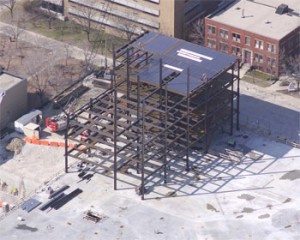Next Tuesday, April 14, will be the occasion for the Law School’s Hallows Lecture. This annual event, named in memory of the late Wisconsin Supreme Court Chief Justice (and Marquette Professor) E. Harold Hallows, brings to the school a distinguished jurist who in a variety of ways has occasion to converse with and teach students, faculty, and others. Past Hallows Lecturers have included Justice Antonin Scalia of the U.S. Supreme Court and Chief Justice Shirley S. Abrahamson of the Wisconsin Supreme Court. More recently, over the last three years, the Hallows Lecture has served as the occasion for a significant address by a judge serving on a federal court of appeals (as can be seen in the 2006 speech by Judge Diane S. Sykes, L’84, of the Seventh Circuit, the 2007 speech by Judge Carolyn Dineen King of the Fifth Circuit, and the 2008 speech by Judge Diarmuid F. O’Scannlain of the Ninth Circuit).
I am very pleased that this year, for the first time, the Hallows Lecture will be delivered by a distinguished sitting trial judge: viz., the Honorable Sarah Evans Barker of the U.S. District Court for the Southern District of Indiana. Judge Barker, who has served on the federal bench since 1984 and is president of the Federal Judges Association (a voluntary organization of Article III judges), is a national figure among trial judges and the federal judiciary more broadly. For the Hallows Lecture, she has selected as her title “Beyond Decisional Templates: The Role of Imaginative Justice in the Trial Court,” and takes as her point of departure Judge Richard A. Posner’s recent book, How Judges Think (Harvard, 2008).
The following is from the Law School’s description of the lecture: “Accepting Judge Posner’s premise that under certain circumstances judges must perform as legislators, Judge Sarah Evans Barker will attempt to expand his focus on appellate decision-making to include a discussion of when and how this approach is and can and should be properly applied in the trial court and of the role of imagination when adjudicating in the ‘open area.'”
The lecture will take place in Room 307 at 4:30 p.m. on Tuesday, April 14. The event is open to all, but registration is required.
 I previously expressed my hope that many will join us at the Law Alumni Awards ceremony, which will occur this Thursday, April 23, 5:30 p.m., at the Alumni Memorial Union. I write again so that I may add that there will be a unique opportunity, before the reception, for anyone interested to place his or her name on Eckstein Hall. That may seem a little odd, for Eckstein Hall is rising several blocks away from the AMU. But we will have available on April 23 outside the AMU the final steel beam that will be placed in Eckstein Hall some weeks from now—and plenty of permanent markers with which folks can sign it. So, whether you are coming to the awards ceremony or not, feel free this Thursday to write your name into the future of Marquette University Law School. The beam will be available under a tent in Parking Lot A (corner of 16th and Wells) from 11 a.m. to 7 p.m.
I previously expressed my hope that many will join us at the Law Alumni Awards ceremony, which will occur this Thursday, April 23, 5:30 p.m., at the Alumni Memorial Union. I write again so that I may add that there will be a unique opportunity, before the reception, for anyone interested to place his or her name on Eckstein Hall. That may seem a little odd, for Eckstein Hall is rising several blocks away from the AMU. But we will have available on April 23 outside the AMU the final steel beam that will be placed in Eckstein Hall some weeks from now—and plenty of permanent markers with which folks can sign it. So, whether you are coming to the awards ceremony or not, feel free this Thursday to write your name into the future of Marquette University Law School. The beam will be available under a tent in Parking Lot A (corner of 16th and Wells) from 11 a.m. to 7 p.m.
